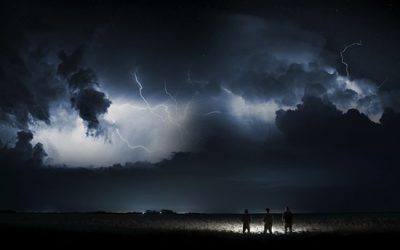Seventh-day Adventists believe that humanity was created perfect and that, at our very core, we crave this kind of perfection and unity with God. But unfortunately, the Bible teaches that we chose to be wise in our own eyes and disobey God, which led to a natural tendency to be sinful, evil, and selfish.
But beyond this, Adventists also believe that God has provided a way to restore us to the perfection we were created for. A way through which we can experience victory over sinful tendencies in this life and be forever free from sin in the future.
This post will go over what the Bible teaches about:
- The corrupt nature of humanity
- How human nature became sinful
- The effects of sin
- Whether we can improve ourselves
- The hope God offers us
- How to overcome sin today
Adventists have summarized this biblical teaching on their website as follows:
“Man and woman were made in the image of God with individuality, the power and freedom to think and to do. Though created free beings, each is an indivisible unity of body, mind, and spirit, dependent upon God for life and breath and all else.
When our first parents disobeyed God, they denied their dependence upon Him and fell from their high position. The image of God in them was marred and they became subject to death.
Their descendants share this fallen nature and its consequences. They are born with weaknesses and tendencies to evil.
But God in Christ reconciled the world to Himself and by His Spirit restores in penitent mortals the image of their Maker. Created for the glory of God, they are called to love Him and one another, and to care for their environment.”
Let’s begin with a look at what having a sinful nature means.
The Bible teaches that human nature is basically corrupt

Photo by JESSICA TICOZZELLI on Pexels
Are people as bad as the Bible claims? What about the good people and the good things they do? How can anyone deny this?
There’s no question that human beings are very capable of good deeds, kindness, extreme selflessness, and generosity. Some people are truly considerate, compassionate, and caring.
But that’s not what the doctrine of human sinfulness is about.
Instead, it deals with the basic nature of all people—and that nature is corrupt.
It is corrupted by sin—which is the breaking of God’s law that calls us to love Him and others (1 John 3:4; Mark 12:30–31). Because of sin, we are naturally selfish, the opposite of love.
Even the worst people can have good traits and, at times, do good things. Yet no matter who they are or how good they appear, their nature is corrupt. Every person is a victim of the disease of sin and has been since the Garden of Eden (more on that later).
Adventists draw this doctrine from the Bible. The following are some verses that support it:
- “For all have sinned and come short of the glory of God” (Romans 3:23, NKJV).
- “Therefore, just as sin came into the world through one man, and death through sin, and so death spread to all men because all sinned” (Romans 5:12, NKJV).
- “The heart is deceitful above all things, and desperately wicked; who can know it?” (Jeremiah 17:9, NKJV).
- “For there is not a just man on earth who does good and does not sin” (Ecclesiastes 7:20, NKJV).
These are a few of the many Bible texts that address the sinful nature of humanity. The Bible also contains many examples of this tendency. In fact, you can find just as many (if not more) examples of people being sinful in the Bible as of people being righteous.
Also, when we take a look at world history or just the news today, what do we find? Over and over, we encounter examples of just how bad humanity can be.
No, not everyone is committing horrific, tragic crimes that affect thousands of people at a time. And that’s not what the Bible teaches.
What it does teach is that everyone has sinful tendencies. Tendencies toward selfishness in the forms of greed, anger, lust, hatred, prejudice, gluttony, and so on.
People might not always act on those tendencies, but even if they don’t, the tendencies are still there. They are in all of fallen humanity—with no exceptions (Isaiah 64:6).
However, it’s important to note that we are not sinful because we have these tendencies. Rather, sin is the result of acting on those tendencies. On our own, we are powerless to resist those tendencies, but Jesus gives us the power to choose and overcome them.
How did human nature—though created perfect by God—become sinful?

Photo by Ismael Sánchez on Pexels
The Bible teaches that God originally made humans perfect and in His own image:
“So God created man in His own image; in the image of God He created him; male and female He created them” (Genesis 1:27, NKJV).
Therefore, human beings didn’t originally have any sinful tendencies or hints of evil. They were perfect beings created by a perfect God and living in a perfect environment.
As Scripture says:
“His work is perfect; for all His ways are just; a God of truth and without injustice; righteous and upright is He” (Deuteronomy 32:4, NKJV).
Also, when God finished His work of creation, He said that it was “very good” (Genesis 1:31, NKJV).
So, what happened?
The crucial issue here is understanding that these perfect humans, Adam and Eve, were also created as free beings who were capable of both love and selfishness.
Think about it like this:
Say you’re a dog lover, and you have a dog named Max. Though you love Max, he still comes with risks, right? He might bite, get sick, or have an accident on the carpet.
Now, you can avoid all of these risks by getting a robot dog that would never bite, get sick, or have accidents in the house.
However, could you really love a robot dog more than your own real dog?
Probably not. It just wouldn’t be the same.
What’s great about real live dogs, even if they aren’t perfect, are their little dog personalities. We lovingly and patiently train them, and in return, we know they actually care about us as their “people.”
This idea may help us understand why God created humans as free moral beings.
Just like you’d prefer your dog Max over the robot dog who cannot love, God also wanted beings who could love. Beings who could have real, authentic relationships. Beings who have the capacity to receive love as well as give it.
And to do that, God had to make them free. Truly free. And true freedom involves risks.
In order to be able to choose God, they had to actually have things to choose between.
Unfortunately, Adam and Eve abused God’s freedom-giving love. They chose to follow their own desires, brought about by Satan’s first temptation. They chose to “be like God” in terms of “knowing both good and evil” (Genesis 3:4–5, NKJV).
That’s how sin came into a world that was originally created perfect. And as a result, humans were greatly impacted and damaged.
They got the exact results of the choice they made—to know both good and evil. That’s the kind of world we live in today, where we can see humanity do great good as well as great evil. And we constantly have to choose between those two forces.
What were the effects of sin?
The effects of sin entering the world were felt both by humanity and nature in general. Let’s look at how both were impacted.
Effects of sin on humanity

Photo by Alexander Grey on Unsplash
In the book of Genesis, the story of the fall of Adam and Eve reveals that the impact of sin was immediate and devastating. And it got worse as time went on.
When Adam and Eve were first created, the Bible specifically says they were naked but not ashamed (Genesis 2:25). This reveals just how innocent they were.
But after the Fall—after they blatantly disobeyed God as free moral beings—what was the first thing to happen?
“Then the eyes of both of them were opened, and they knew that they were naked; and they sewed fig leaves” (Genesis 3:7, NKJV).
Immediately, they felt ashamed of themselves and their nakedness. And this led them to hide from God in fear (Genesis 3:8–10).
Then, their relationship with one another began showing cracks too. Adam blamed Eve for the unfortunate incident and, by extension, blamed God for giving him Eve (Genesis 3:11–12).
But as bad as it seemed already, the downward spin didn’t stop there. Things got worse, fast.
One of Adam and Eve’s children even murdered his sibling (Genesis 4:8). And from then on, there has been no end to the moral decline of the human race.
The Bible says eventually, “the wickedness of man was great in the earth, and that every intent of the thoughts of his heart was only evil continually” (Genesis 6:5, NKJV).
Many centuries later, the apostle Paul wrote about the nature of humanity:
“There is none righteous, no, not one” (Romans 3:10, NKJV).
And the Psalmist even says that we are born in sin (Psalm 51:5).
Given the history of the past few centuries—war after war, slavery, the Holocaust, terrorism, the gap between the rich and the poor, crime, and so forth—things have not gotten any better.
While humanity attempts to solve some problems of evil as our race advances, sin just finds new ways to corrupt.
Ultimately, all these evils come down to one thing: the sinful nature of humanity. In our natural state, we don’t tend towards God’s ways and His ideal for man, but away from it to sin and evil (1 Corinthians 2:14).
And every time we sin, succumbing to our selfish nature, we can expect that there will be consequences.
Effects of sin on the natural world

Photo by Chris Gallagher on Unsplash
Yes, bad people do bad things to other people. But how do we explain “natural evils” like famines, diseases, floods, earthquakes, and other disasters?
Adventists attribute these things to sin, as well.
As stated in Genesis, God created this world as a “very good” place, which meant that it certainly didn’t contain those natural evils. However, after the entrance of sin, even the natural world was negatively impacted.
Dr. John Fowler, an Adventist scholar, put it like this:
“The moment that Adam and Eve sinned, evil resulted in both the physical and moral worlds…. Since that moment, vast changes have taken place in the physical world.”1
The Bible talks about some of the physical changes to the planet that resulted from sin:
- The arrival of thorns and thistles (Genesis 3:17, 19)
- The curse on the ground after Cain’s sin (Genesis 4:12)
- The aftermath of the flood (Genesis 7:12)
All of creation suffers from what sin has caused. Paul wrote that “the creation itself also will be delivered from the bondage of corruption…. For we know that the whole creation groans and labors” (Romans 8:21–22, NKJV).
But the greatest physical change that came to the world after sin was death, which didn’t exist until then.
It’s hard to imagine how different a world without death must have been from the world we live in today.
Has the nature of humanity improved in recent years?
At various times, especially in the past half a millennium, people—Christians and non-Christians alike—have seen the terrible things humans do to one another and have tried on a massive scale to improve the world. But ultimately, their efforts have been futile.
This leaves us with the question, Can we change ourselves for the better?
Some believed that, yes, we could change ourselves for the better.
In the 1600s, the Scientific Revolution and the Enlightenment began to take hold in Europe. As people started to shed many of the superstitions of the past, science and technology promised great things for the future.
Science, technology, logic, and reason were already beginning to make life easier.
But they haven’t made human nature any better.
Even in some cases, technology only furthered the expression of evil. Like the invention of the guillotine, which was supposed to make capital punishment more humane, and the invention of chemical and biological warfare.
Scientific progress can be a wonderful thing…but sin adapts as well. The same evils committed with sticks and rocks are now committed with machines, weapons, and chemicals.
Even Albert Einstein, who was perhaps feeling guilty about how his science helped create the bombs that destroyed Hiroshima and Nagasaki, lamented:
“Our entire much-praised technological progress, and civilization generally, could be compared to an axe in the hand of a pathological criminal.”2
Or as Dr. Martin Luther King Jr. famously said:
“Our scientific power has outrun our spiritual power. We have guided missiles and misguided men.”3
None of this should be surprising.
Looking forward to the end of time, Jesus did not depict a world progressing toward utopia before His return. On the contrary, He warned:
“And you will hear of wars and rumors of wars. See that you are not troubled; for all these things must come to pass, but the end is not yet. For nation will rise against nation, and kingdom against kingdom” (Matthew 24:6–7, NKJV).
The apostle Paul doesn’t paint a picture of a humanity that has morally progressed as time has gone on, either:
“But know this, that in the last days perilous times will come: men will be lovers of themselves, lovers of money, boasters, proud, blasphemers, disobedient to parents, unthankful, unholy, unloving, unforgiving, slanderers, without self-control, brutal, despisers of good, traitors, headstrong, haughty, lovers of pleasure rather than lovers of God, having a form of godliness but denying its power” (2 Timothy 3:1–5, NKJV).
And it all comes down to sinful human nature. Regardless of the state of the world, the governments, the technology, humans will always find new ways to be self-serving at the expense of others.
If this is our nature, what hope do we have?
The good news is that God loves us, despite our sinful nature and our choices to sin. And He had a plan in place—even before humans chose to sin—to save us from sin’s power and consequences.
He loves us so much that Jesus came to this world and died, taking the penalty of sin we deserved. He did the most selfless thing He could do: give His life for those He loves.
This text can’t be quoted enough:
“For God so loved the world that He gave His only begotten Son, that whoever believes in Him should not perish but have everlasting life” (John 3:16, NKJV).
That text could also be read as, “For God so loved sinful, fallen humanity that He sent His own Son…”
And that’s what the gospel is all about. It’s what God has done to save us, despite us being who we are:
“But God demonstrates His own love toward us, in that while we were still sinners, Christ died for us” (Romans 5:8, NKJV).
Notice, it didn’t say that Christ waited until we were good people or until we stopped sinning, and then He died for us. No, when we were still sinners, Christ died for us because that makes it possible for Him to eventually destroy sin without destroying us in the process.
The Bible also says that Jesus Christ was “the Lamb slain from the foundation of the world” (Revelation 13:8, NKJV).
Before the foundation of the world? How far back that goes, we don’t know. But one thing is certain—it goes back long before we existed, which means that, long before we existed, God had a plan in place to meet the crisis of sin when it came. And that plan was centered around Jesus, the second person of the Godhead, dying for us.
The death and resurrection of Jesus, which is central to the plan of salvation, is God’s way of remedying sin sickness forever.
How can we live in that hope and overcome sin today?

Photo by Zac Durant on Unsplash
Jesus set us an example of victory over sin. By following His example and depending on the power of God, human beings no longer have to be slaves to their sinful tendencies. The Bible assures of this numerous times, including in the following passage:
“Therefore we were buried with Him through baptism into death, that just as Christ was raised from the dead by the glory of the Father, even so we also should walk in newness of life” (Romans 6:4, NKJV).4
In the new covenant, God promises to put His “laws in [our] mind and write them on [our] hearts” (Hebrews 8:10, NKJV).
In other words, God promises us a new nature with the power we need to obey His law. He will even write that law in our hearts, which is why Adventists believe in victory over sin now. We believe that through the power of Christ in us, we can overcome every selfish tendency and temptation (2 Corinthians 5:17; Colossians 3:1–8).
It doesn’t mean we’ll never sin again, but it means we’re allowing the Holy Spirit to work within us, gradually breaking the hold sin has over us (Ephesians 2:1–6; 4:22–32; Galatians 5:16).
While we are aware that we are sinners, we rest in the fact that Jesus’ sinless life stands in place of ours. We know we are loved and accepted by God because of Jesus, which is why we can claim this promise by faith:
“There is therefore now no condemnation to those who are in Christ Jesus, who do not walk according to the flesh, but according to the Spirit” (Romans 8:1, NKJV).
Want to experience this hope and freedom in overcoming sin?
Choose an Online Bible Study
Want to keep learning? Find out more about Jesus, humanity, the plan of salvation, and how God loves you enough to sacrifice everything, just to give you a chance to choose Him.
Sometimes it can be hard to know where to start, that’s why we offer free, user-friendly, online Bible study options you can do anytime, anywhere, and at your own pace.
This online Bible school will take you through the major themes of Scripture, breaking down the Bible’s complex concepts into bite-sized pieces, which can lead you toward the answers of life’s more challenging questions.
- Handbook of Seventh-day Adventist Theology (Review and Herald, Silver Spring, MD, 2007), p. 245. [↵]
- Lightman, Alan, A Sense of the Mysterious (Vintage Books, New York, 2006), p. 110. [↵]
- “Martin Luther King, Jr. On Science And Religion,” Forbes. [↵]
- See also 1 Corinthians 15:57; Romans 6:6–7, 14; 1 Corinthians 10:13. [↵]
Related Articles
More Answers
Adventist Beliefs
Learn how the 28 Fundamental Beliefs summarize and describe Seventh-day Adventism. They are not a checklist of requirements; instead they show how Adventists interpret and apply Scripture.
What Do Adventists Believe About the Authority of the Bible?
Learn how one really old book (the Bible) is the sole foundation for all Seventh-day Adventist beliefs.
Is the Soul Immortal? Exploring What Adventists Believe
Based on the way the Bible describes humanity in comparison to God and angels, Seventh-day Adventists believe souls are not something you have, but something you are.
What Do Adventists Believe About the Mark of the Beast and 666?
It’s a popular topic, especially during tumultuous times. When everything around you feels chaotic, it’s easy to wonder about the end of the world, and topics like the mark of the beast, as mentioned in Revelation 13, can stir up uneasiness.
What Do Adventists Believe About the Atonement?
If you’ve spent much time in the Bible books of Leviticus or Numbers, you might’ve noticed the word atonement.
Do Seventh-day Adventists Believe Only They Will Go to Heaven?
No, Adventists definitely don’t believe they’re the only ones that will go to heaven. As a matter of fact, we don’t believe admittance into heaven is ever based on which church or denomination we belong to. People all over the world from different Christian denominations, religions, and walks of life will be welcomed by Jesus.
How Adventists Developed the Sanctuary Doctrine and What It Means
The sanctuary was a building at the center of ancient Israelite society that gives us a small picture of the original sanctuary, God’s throne room in heaven (Hebrews 8:1-2).
What Do Adventists Believe About Faith and Works?
Adventists believe we are saved by faith, which is the belief and trust we have in Jesus to save us from our sins. Jesus, then, enables us to live in harmony with God’s commandments and serve others with love—sometimes referred to as “works.”
Do Seventh-day Adventists Believe in Hell?
Seventh-day Adventists believe that any human being who accepts God’s free gift of salvation through Jesus will be given eternal life. But what about the eternal fate of those who choose not to accept Jesus?
Sola Scriptura—What It Means and Why It Matters
Sola scriptura is a term that originated during the Protestant Reformation. It represents the way many Christians view the Bible and its authority. While the idea is simple enough, there is so much more to sola scriptura than its basic definition.
Do Seventh-day Adventists Believe in the Secret Rapture
The secret rapture belief asserts that the followers of Jesus will be suddenly and stealthily “raptured” from earth and taken to heaven. Then, any people left on earth will face a period of great difficulty—before Christ’s second coming actually happens.
Why do Adventists Emphasize Religious Liberty?
Adventists see religious liberty as an essential human right. After all, God endowed humanity with freedom of choice from the very beginning. So we believe it’s best for governments to also support their citizens’ rights to worship based on their convictions.
What Seventh-day Adventists Believe About Growing in Christ
Christian growth is the experience of allowing Jesus Christ to work in our lives through the Holy Spirit and restore in us the image we were designed for—God’s image of selfless, other-centered love.
What Do Seventh-day Adventists Believe about the New Earth?
Seventh-day Adventist, like other Christians, believe that after the second coming of Christ, God will cleanse our earth by fire and then restore it back to Eden-like perfection.
What Adventists Believe About the Millennium and the End of Sin
As most Christians, Seventh-day Adventists hope for the time when sin and evil will no longer exist. The Bible teaches that God will bring an end to sin after a thousand-year period of time called the millennium.
What Are Seventh-day Adventists Beliefs on Death and the Resurrection?
The thought of dying can seem scary. And the idea of being resurrected—or coming back to life—can seem a little uncomfortable.
What Do Seventh-day Adventists Believe about The Second Coming of Christ?
The second coming of Jesus Christ is an event the Bible prophesies will occur at the end of this world’s history. It’s called His second coming to distinguish it from His first, when Jesus was born to Mary and lived as a human before dying on the Cross.
What Adventists Believe About Jesus’ Ministry in the Heavenly Sanctuary
The ancient Israelite sanctuary had a daily service and a yearly service. Jesus’ death on the Cross and His ministry in the heavenly sanctuary reflect these services.
What do Seventh-day Adventists Believe about Marriage and Family?
The Seventh-day Adventist Church believes God established marriage and the family unit to be blessings to humanity. They make up a relational structure that can reflect the multifaceted nature of God’s love.
What Seventh-day Adventists Believe about Christian Behavior
The patterns of actions and words that make up behavior are central to any type of belief system because they flow from those beliefs. Seventh-day Adventists look to the Bible, with Jesus as the perfect example, for guidance on shaping our daily behavior.
What do Seventh-day Adventists Believe about the Sabbath?
Seventh-day Adventists believe that the biblical Sabbath is a beautiful gift of rest that God gave to us at Creation and that remains valid to this day. Falling on the seventh day of the week—Saturday—it connects us to God in a special way and offers us a weekly opportunity to be physically, mentally, and spiritually refreshed.
What Seventh-day Adventists Believe about Stewardship (and What Does It Mean?)
Love for God and our fellow humans is the overriding principle of the Seventh-day Adventist faith. And we express that love in an overarching way through how we manage the things—material and immaterial—that God has entrusted to us.
What Do Adventists Believe About the Law of God?
Seventh-day Adventists believe that God’s law reflects His character of love (1 John 4:8; Romans 13:10). It is perfectly summarized in the Ten Commandments given to Moses on Mount Sinai, showing us the practical application of loving God and loving other people.
What Do Seventh-day Adventists Believe About the Gift of Prophecy?
Adventists believe the gift of prophecy is a spiritual gift that the Holy Spirit gives to specific individuals to help the church carry out Jesus’ Great Commission (Matthew 28:16–20). Prophecy helps strengthen, encourage, and comfort His people (1 Corinthians 14:3).
What Seventh-day Adventists Believe About Spiritual Gifts in the Bible
Seventh-day Adventists believe that spiritual gifts are talents that the Holy Spirit gives to believers and followers of Jesus Christ. These gifts are different but complementary, and they often equip followers of Christ with the ability to spread the good news about Jesus and encourage its members.
What do Seventh-day Adventists Believe about the Lord’s Supper (Communion)?
Like many Protestant Christians, Seventh-day Adventists believe in the practice commonly called the Lord’s Supper or Holy Communion. They drink grape juice and eat unleavened bread in obedience to Jesus’ direct instructions to do it in remembrance of Him (1 Corinthians 11:24–25).
What do Seventh-day Adventists Believe about Baptism?
Like many Protestant Christians worldwide and throughout history, the Seventh-day Adventist Church believes in baptism, a ceremony in which individuals go under water to publicly demonstrate dying to an old life and beginning a new life in Christ. We baptize people by immersion, as taught and exemplified in the Bible.
What Do Seventh-day Adventists Believe about Unity in Christ?
Seventh-day Adventists believe in biblical unity—the idea of believers in Jesus being united by the truth of the Bible and the common goal of representing God and His love to the world.
What do Seventh-day Adventists Believe about the Remnant and its Mission?
The “remnant” are a group of faithful believers that have existed throughout history and proclaimed God’s truth, love, and plan to save humanity. They “remain” with God even amid persecution and also when it seems everyone else has rebelled against God or compromised their beliefs.
Didn’t find your answer? Ask us!
We understand your concern of having questions but not knowing who to ask—we’ve felt it ourselves. When you’re ready to learn more about Adventists, send us a question! We know a thing or two about Adventists.

































